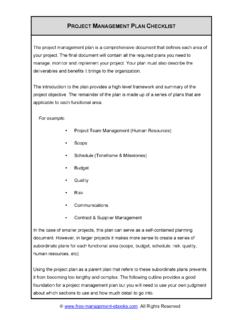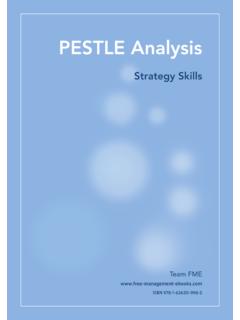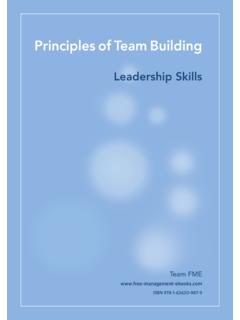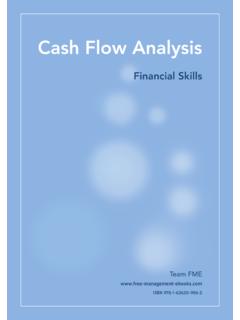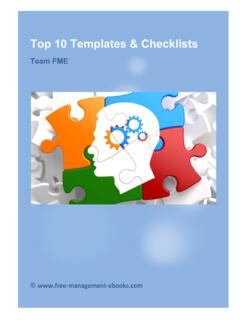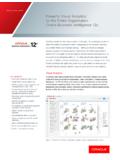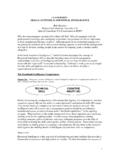Transcription of Understanding Emotional Intelligence - Online …
1 Understanding Emotional Intelligence People Skills Team FME management 2014 2 Understanding Emotional Intelligence 2 2014 Copyright Notice 2014. All Rights Reserved The material contained within this electronic publication is protected under international and Federal Copyright Laws and treaties, and as such any unauthorized reprint or use of this material is strictly prohibited. You may not copy, forward, or transfer this publication or any part of it, whether in electronic or printed form, to another person, or entity. Reproduction or translation of any part of this work without the permission of the copyright holder is against the law.
2 Your downloading and use of this eBook requires, and is an indication of, your complete acceptance of these Terms of Use. You do not have any right to resell or give away part, or the whole, of this eBook. Understanding Emotional Intelligence 3 2014 3 Preface This eBook explains why managers across the globe have embraced emotionally intelligent leadership, an idea that is now used routinely in almost all businesses and professional training programs. Successful management is all about getting work done through other people, some of whom you have no direct authority over. This is directly correlated to your success in self-awareness, self-management, and social awareness, all of which are essential elements of Emotional Intelligence .
3 You will learn to: Understand the Emotional Intelligence model and its core competencies Discover the benefits of Emotional Intelligence for yourself, your team, and organization Identify strategies and opportunities to apply Emotional Intelligence in your role Choose perceptions and behaviors that will lead to positive outcomes Visit Our Website More free management eBooks along with a series of essential templates and checklists for managers are all available to download free of charge to your computer, iPad, or Amazon Kindle. We are adding new titles every month, so don t forget to check our website regularly for the latest releases. Visit 4 Understanding Emotional Intelligence 4 2014 Table of Contents Visit Our What is Emotional Intelligence (EQ).
4 9 Emotional Intelligence (EQ) and EQ Can EQ be Developed?..24 Personal Social Other Free Appendix Emotional Intelligence Understanding Emotional Intelligence 5 2014 5 Introduction Over the last two decades organizations have seen a fundamental shift in management style. Roles have become more customer orientated and knowledge based with the need to work as a team. This has resulted in individuals having more overall autonomy, even at fairly low levels within organizations. This has created organizational cultures that are less autocratic with only a few levels of management. The very nature of such organizations has allowed those with highly developed social skills to be as successful as those who excel academically.
5 The historical timeline of social or Emotional Intelligence shows this is not a new concept, but one that over time has gained general agreement as a key element of workplace success. Emotional Intelligence can be abbreviated to (EI), and can also be referred to as Emotional Quotient (EQ). The psychologists Salovey and Mayer originally coined the term Emotional Intelligence in 1990. However, Daniel Goleman popularized it in 1995 in the title of his bestselling book, Emotional Intelligence : Why it can Matter More than IQ. Goleman defined Emotional Intelligence as: Emotional Intelligence (EI or EQ) May influence personal success more than IQ Unlike IQ, Emotional Intelligence can be improved 6 Understanding Emotional Intelligence 6 2014 Understanding one s own feelings, empathy for the feelings of others and the regulation of emotion in a way that enhances living.
6 What made this book so popular were two claims: Firstly, Emotional Intelligence may be more important for personal success than IQ. Secondly, Unlike IQ Emotional Intelligence can be improved. These two claims resonated with people and made the idea of Emotional Intelligence a hot topic for anyone involved with personal development. Whilst Goleman s first book made a compelling case for the importance of Emotional Intelligence theory (EQ Emotional Quotient), there was no practical means of applying it to management situations. In this book he identified the five domains of EQ: Knowing your emotions Emotional Intelligence domains: Know Your Emotions Manage Your Emotions Recognize & know Others' Emotions Manage the Emotions of Others Motivate Yourself Understanding Emotional Intelligence 7 2014 7 Managing your own emotions Motivating yourself Recognizing and Understanding other people s emotions Managing relationships ( managing the emotions of others) In Working with Emotional Intelligence , his second book, he explored how our performance at work related to how we dealt with others and conducted ourselves.
7 Since 1995 numerous business books have been written on Emotional Intelligence in the workplace and most authors have used Goleman s model. Whilst there is some common agreement between Goleman and other authors and researchers that: Emotional Intelligence exists It is a factor in personal and professional success It can be improved there are also some quite fundamental disagreements. This is not surprising in a relatively immature area of psychology that has a great deal of prestige and financial rewards associated with it. For academic researchers this prestige takes the form of professional recognition and associated funds for research. For commercial organizations it is the financial rewards gained from creating and selling a proprietary method for staff selection or professional development.
8 The job of a manager is to achieve business and personal objectives through the use of other people. These include the manager s own team and other managers within the organization, as well as customers and suppliers. To be a successful manager you need to have a good Understanding of Emotional Intelligence , how well developed your own EI, is and how to use it to achieve your objectives. 8 Understanding Emotional Intelligence 8 2014 Key Points Daniel Goleman popularized the term ' Emotional Intelligence ' in 1995 in the title of his bestselling book, Emotional Intelligence : Why it can Matter More than IQ. Emotional Intelligence can be defined as Understanding one s own feelings, empathy for the feelings of others and the regulation of emotion in a way that enhances living.
9 Not everyone agrees with Goleman s model of Emotional Intelligence , but there is general agreement that Emotional Intelligence exists, that it is a factor in personal and professional success, and that it can be improved. Understanding Emotional Intelligence 9 2014 9 What is Emotional Intelligence (EQ) The five domains of Goleman s EQ model have become the de facto standard as far as applying Emotional Intelligence in the workplace is concerned. Many business-orientated models represent these five domains in four quadrants: two represent personal competence and two represent social competence. Personal Competence This area of competence is concerned with three of the five domains Goleman referred to and is split into two quadrants: self-awareness and self-management.
10 Self-awareness means that you understand how you feel and can accurately assess your own Emotional state. 5. Manage relationships (others' emotions) 2. Manage your emotions 3. Motivate yourself 4. Recognize & understand other people's emotions 1. Know your emotions SELF-AWARENESS SOCIAL AWARENESS RELATIONSHIP MANAGEMENT SELF-MANAGEMENT 10 Understanding Emotional Intelligence 10 2014 There are three components to this quadrant: self-awareness, accurate self-assessment, and self-confidence. Self-assessment includes Understanding your own strengths and weaknesses. It is also about being willing to explore them both, either by thinking about them yourself or by discussing them with others.
